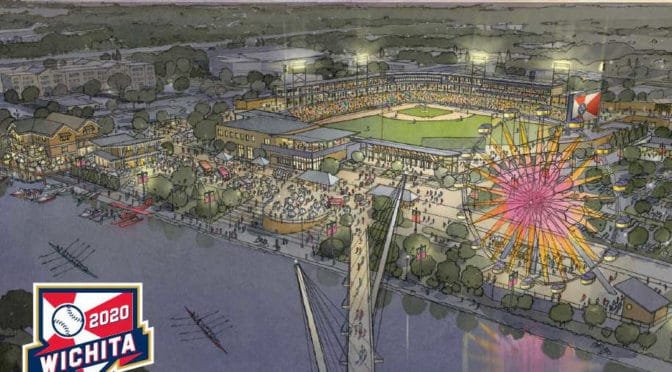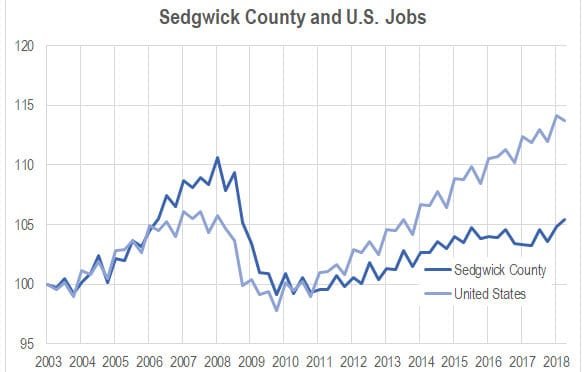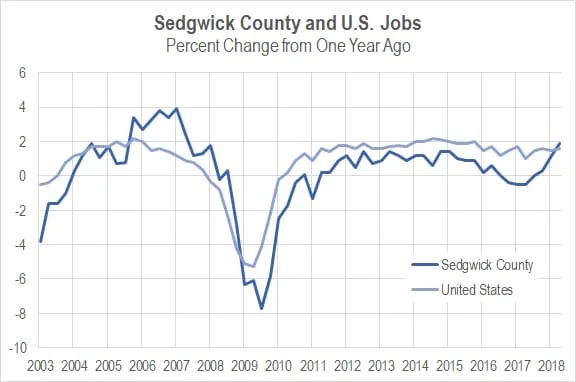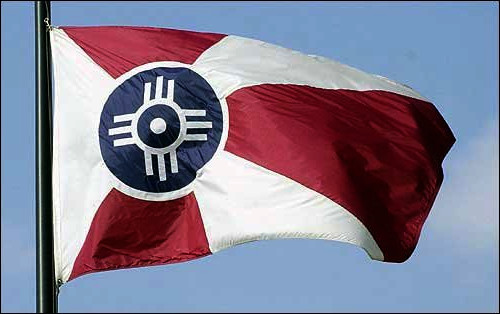A bond disclosure document anticipated a development agreement for land surrounding the new Wichita ballpark.
When offering bonds for sale, issuers file a disclosure document that is often full of interesting detail. In the disclosure for the STAR bonds for the new Wichita ballpark, we learn this:
The City and the owner of the minor league team are anticipated to enter into a development agreement whereby the owner has the ability to develop approximately 15 acres of property surrounding the stadium. The development agreement is anticipated to require development to commence within 18 months of completion of the stadium and include the development of a hotel, retail spaces, restaurants and bars to complement the stadium and surrounding areas.
This is from a document dated November 1, 2018 and filed with the Municipal Securities Rulemaking Board on November 16, 2018. This seems to contradict a claim made by Wichita Mayor Jeff Longwell and other city officials that the city was barred from disclosing the fact of land development negotiations until last week. The bond disclosure is silent regarding terms of an agreement.
Following are some excerpts from the disclosure. The complete document is available at https://emma.msrb.org/IssueView/Details/ER387382.
$42,140,000
City of Wichita, Kansas
Sales Tax Special Obligation Revenue Bonds
(River District Stadium Star Bond Project)
Series 2018
Official Statement dated November 1, 2018
STAR Bonds Overview
(page 1)
“Sales tax and revenue” bonds (“STAR Bonds”) are authorized to be issued by the City pursuant to K.S.A. 12-17,160. et seq., as amended (the “STAR Bond Act”), The STAR Bond Act provides a form of tax increment financing that enables the issuance of bonds payable from certain State and local sales and compensating use tax revenues generated from STAR Bond projects constructed within a STAR Bond district.
To implement STAR Bond financing, a local government must adopt a resolution that specifies a proposed STAR Bond project district’s boundaries and describes the overall district plan, hold a public hearing on the district and the plan, and pass an ordinance that establishes the STAR Bond project district.
There may be one or more proposed STAR Bond projects within a STAR Bond project district. As with the STAR Bond project district, the local government must adopt a resolution, hold a hearing, and pass an ordinance that establishes each such STAR Bond project. Each project also must have a project plan that includes a description and map of the project area, a plan for relocating current residents and property owners, a detailed description of the proposed buildings and facilities and a feasibility study showing that the project will have a significant economic impact, generate enough tax revenues to pay off STAR Bonds proposed to be issued to finance the project, and not adversely affect existing businesses or other STAR Bonds that have already been issued. STAR Bonds can be used to pay for certain costs of a STAR Bond project, including property acquisition, site preparation, infrastructure improvements, certain hard construction costs, bond issuance costs, bond financing costs, loan financing costs, and related soft costs.
The District and the Project
(page 2)
In 2007, the City adopted the River District STAR Bond Project Plan (the “Original Project Plan”) for an approximately 210 acre tract known as the East Bank Redevelopment District (the “Original District” or the “Phase I Project Area”). The Original Project Plan anticipated a $155.8 million redevelopment project along the banks of the Arkansas River (the “River”) through the City’s Central Business District.
In December 2016, the City adopted an ordinance to expand the boundaries of the Original District by adding approximately 64 acres located on the west bank of the River north from Kellogg Avenue to approximately 1st Street (the “Additional Property.” the “West Bank Project Area” or the “Phase II Project Area”). The West Bank Project Area includes commercial properties, the City’s Lawrence-Dumont Baseball Stadium, the Wichita Ice Center and the Wichita Public Library’s Advanced Learning Library. The Original District, as expanded by the Additional Property, is referred to herein as the “STAR Bond District” or the “District.”
The West Bank Project Area was added to the Original District to fund additional riverbank improvements between Douglas Avenue and the Kellogg Avenue Bridge, to install a pedestrian bridge to connect the performing arts area on the East Bank with the sports and entertainment area on the West Bank, to construct a multi-sport athletic facility that will replace the existing Lawrence-Dumont Baseball Stadium on the same site and to construct a baseball-themed spoils museum in conjunction with the multi-sport athletic facility. On December 20, 2016. the Secretary of Commerce of the State of Kansas (the “Secretary”) determined that the District, as expanded by the Additional Property, is an “eligible area” within the meaning of the STAR Bond Act.
On January 3, 2017, the City adopted an ordinance to approve the Project Plan Amendment to the STAR Project Plan, dated as of December 2016 (the “STAR Bond Project Plan Amendment”). The STAR Bond Project Plan Amendment included a pedestrian bridge across the River, a baseball/sports museum, riverbank improvements and design and site work related to the baseball stadium. Major components of the STAR Bond Project Plan Amendment and the Phase II Project Plan (the “2018 Projects”) include the following:
(i) the replacement of the City’s existing Lawrence-Dumont Baseball Stadium expected to be the home a Triple-A minor league affiliate of the Miami Marlins;
(ii) a museum and home of the National Baseball Congress; and
(iii) a pedestrian bridge across the River.
(page 5)
The proceeds of the Series 2018 Bonds, along with other available fluids, will be used to (i) pay a portion of the costs of the 2018 Projects; (ii) fond a deposit to the Capitalized Interest Fund established under the Indenture for the Series 2018 Bonds to be used to pay interest on the Series 2018 Bonds through September 1, 2020; and (iii) pay certain costs related to the issuance of the Series 2018 Bonds.
(Page 8)
THE DISTRICT AND THE 2018 PROJECTS
The Original STAR Bond District and the Original Project
In 2007, the City adopted the Original Project Plan for the Original District. The Original Project Plan anticipated a $155.8 million redevelopment project along the banks of the River through the City’s Central Business District. The first phase of the project plan extended from the First/Second Street Bridge to the Central Avenue (Little Arkansas) and Seneca Street (Big Arkansas) bridges. It included upgrades to the area surrounding the Keeper of the Plains statue at the confluence of the rivers. Additional construction included a portion of the South Riverbank to the west of Exploration Place, two cable-stayed pedestrian bridges linking the Keeper of the Plains monument to the outer banks of each river, and work along the East Riverbank from Central to First Street. The first phase also included construction of the Fountains at WaterWalk, a fountain attraction incorporating programmed water jets linked to lights and music.
The East Riverbank Project was completed in 2011 as part of the Drury Plaza Hotel Broadview redevelopment. The $2,500,000 STAR revenue financed project involved extensive East Riverbank improvements north of Douglas Avenue. This project phase supported the $29 million Drury Plaza Hotel redevelopment project. Improvements included a venue space, pedestrian access from Waco Street and river overlook areas.
The recently completed West Bank Apartments Project, located within the boundaries of the Original District, included a West Riverbank promenade between Second Street and Douglas Avenue and the Chisholm Trail McLean Memorial Fountain area, riverbank improvements with landscaping, fountains and walking/bike paths along the River. These improvements are associated with a tax increment financing and community improvement district development that includes an apartment complex, parking garage and a boat and bike rental facility. STAR Bonds financed $4,750,000 of West Riverbank improvements associated with the West Bank Apartments Project.
The Expanded STAR Bond District
In December 2016, the City adopted an ordinance to expanded the boundaries of the Original District by adding approximately 64 acres located on the west bank of the River north from Kellogg Avenue to approximately 1st Street (the “Additional Property,” the “West Bank Project Area” or the “Phase II Project Area”). The West Bank Project Area includes commercial properties, the City’s Lawrence-Dumont Baseball Stadium the Wichita Ice Center and the Wichita Public Library’s Advanced Learning Library. The Original District, as expanded by the Additional Property, is referred to herein as the “STAR Bond District” or the “District.” A map depicting the boundaries of the District, is set forth above.
The West Bank Project Area was added to the Original District to fund additional riverbank improvements between Douglas Avenue and the Kellogg Avenue Bridge, to install a pedestrian bridge to connect the performing arts area on the East Bank with the sports and entertainment area on the West Bank, and to construct a baseball-themed sports museum on the site of the Lawrence-Dumont Baseball Stadium. On December 20, 2016, the Secretary of Commerce of the State of Kansas (the “Secretary”) determined that the District, as expanded by the Additional Properly, is an “eligible area” within the meaning the of the STAR Bond Act.
The 2018 Projects
On January 3, 2017, the City adopted an ordinance adopting the STAR Bond Project Plan Amendment which provided for additional development within the District. On March 20, 2017, the Secretary took the following actions with respect to the District and the STAR Bond Project Plan Amendment:
(1) found and determined that the District, as expanded, is a major commercial entertainment and tourism area and an “eligible area” within the meaning of the STAR Bond Act;
(2) approved and designated improvements to the West Bank of the Arkansas River and enhanced public improvements within the District as part of a “STAR bond project” within the meaning of the STAR Bond Act; and
(3) approved the issuance of up to $19,500,000 (exclusive of approved financing costs) in STAR Bond financing for the improvements and amenities related to the STAR Bond Project Plan Amendment.
On May 2, 2017, the City adopted an ordinance adopting the River District Phase II STAR Bond Project Plan (the “Phase II Project Plan”) which provides for the redevelopment of the West Bank Project Area. On April 30, 2018, the Secretary took the following actions with respect to the District and the Phase II Project Plan:
(1) found and determined that the District, as expanded, includes a “major multi-sport athletic facilities” and museum components and is an “eligible area” within the meaning of the STAR Bond Act;
(2) approved and designated improvements to the East Bank of the Arkansas River and enhanced public improvements within the District as part of a “STAR bond project” within the meaning of the STAR Bond Act; and
(3) approved the issuance of up to $20,500,000 (exclusive of approved financing costs) in STAR Bond financing for the improvements and amenities related to the Phase II Project Plan.
Major components of the Phase II Project Plan (also known as the “2018 Project”) include the following:
(i) the replacement of the City’s existing Lawrence-Dumont Baseball Stadium which is expected to be the home a Triple-A minor league affiliate of the Miami Marlins;
(ii) a museum and home of the National Baseball Congress; and
(iii) a pedestrian bridge across the River.
The estimated overall plan of finance for the 2018 Projects includes the use of fluids provided from other available City fluids or borrowings, including proceeds of general obligation bonds and revenues from tax increment financing districts and community improvement districts, which proceeds are expected to be available in the first half of 2019. The following table provides a summary of the sources and uses of such funds:
Sources of Funds
STAR Bonds: 40,000,000.00
Available City Funds & Financing: 43,000,000.00
Total Sources: 83,000,000.00
Uses of Funds
Stadium & Museum: 75,000,000.00
Pedestrian Bridge: 3,000,000.00
Riverbank Improvements: 3,000,000.00
Parking & Infrastructure: 2,000,000.00
Total Uses: 83,000,000.00
The existing Lawrence-Dumont Baseball Stadium was constructed in 1934 as part of the Works Progress Administration during the Great Depression. The stadium previously served as the home to the Wichita Wranglers (Class AA Texas League) through the 2007 baseball season. As part of the plans to continue to redevelop the City’s downtown area, the City has estimated the demolition of the current stadium by year end 2018 and completion of the new stadium by March 2020. The new facility is estimated to include 6,500 to 7,000 fixed seats, with group areas and other spaces bringing total capacity to around 10,000. The stadium will serve as the home for a to-be-named Triple A minor league affiliate of the Miami Marlins and be used to hold concerts and various high school and collegiate sporting events.
The City and the owner of the minor league team are anticipated to enter into a development agreement whereby the owner has the ability to develop approximately 15 acres of property surrounding the stadium. The development agreement is anticipated to require development to commence within 18 months of completion of the stadium and include the development of a hotel, retail spaces, restaurants and bars to complement the stadium and surrounding areas.
Other Anticipated Development in the District
Anticipated future phases of development expected to occur within the West Bank Project Area include: (i) completion of the west bank corridor improvements from Douglas Avenue south to Kellogg with an estimated $5 million in STAR Bond funded improvements for a plaza and riverbank amenities designed to complement the stadium and surrounding Delano neighborhood; (2) an East Bank Catalyst Site north of the Broadview Hotel redevelopment site and across the River from the West Bank Apartments Project (as described above), with an anticipated $40 million mixed-use development along the river that complements both the River corridor and adjacent Broadview Hotel and includes an estimated $4 million in STAR Bond financed plaza and River bank amenities; and (3) development of the area referred to as the Upper Reach, extending from the Seneca Street Bridge to Sim Park on the opposite side of the River.
The City and EPC Real Estate Group. LLC (the “Delano Catalyst Site Developer”) have entered into a Development Agreement relating to certain property within the West Bank Project Area, consisting to the property south and east of the Wichita Public Library’s Advanced Learning Library. Pursuant to the Development Agreement, the Delano Catalyst Site Developer has agreed to develop the property to include the following:
- a public greenway/gathering area on the property;
- an apartment complex consisting of a minimum of 180 apartment units;
- a hotel consisting of a minimum of 90 guest rooms;
- a minimum of 114 parking spaces available to the public; and
- a minimum of 5,000 square feet of Class A commercial space.
The Delano Catalyst Site Developer has agreed to meet certain project milestones in connection with the development of the property, including full project completion by October 1, 2020.
Projected Incremental Tax Revenues
(page 14)
Click here to view Wichita ballpark STAR bonds series 2018 projected incremental tax revenues.pdf
(page 15)
SOURCES AND USES OF FUNDS
The following sets forth the estimated sources and uses of fluids relating to the proceeds of the Series 2018 Bonds:
Sources of Funds
Series 2018 Bond Principal: 42,140,000.00
Net Original Issue Premium: 1,733,967.20
Total Sources: 43,873,967.20
Uses of Funds
Deposit to Project Fund: 40,000,000.00
Deposit to Capitalized Interest Fund: 3,276,163.30
Costs of Issuance(1): 597,803.90
Total Uses: 43,873,967.20
(1) Includes underwriters’ discount (see “UNDERWRITING” herein) and other costs of issuance related to the Series 2018 Bonds.
Debt Service Requirements
(page 16)
Click here to view Wichita ballpark STAR bonds series 2018 debt service requirements.pdf
















